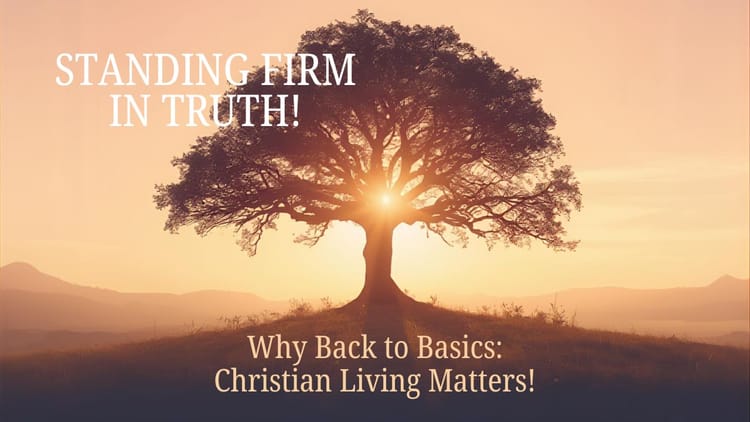Salvation & Sanctification!

Two Aspects of God's Grace Working Together
Salvation and sanctification are two of the most vital doctrines in Scripture, and they are beautifully interconnected. Whilst salvation marks the glorious beginning of our relationship with God, sanctification represents the ongoing work of the Holy Spirit in our lives. Together, they reveal the complete picture of God's redemptive plan for His people.
Understanding Salvation
Salvation is God's gracious act of delivering us from the penalty and power of sin through faith in Jesus Christ. It is not something we can earn or achieve through our own efforts. The Apostle Paul makes this abundantly clear: "For by grace are ye saved through faith; and that not of yourselves: it is the gift of God: Not of works, lest any man should boast" (Ephesians 2:8-9, KJV).
At the moment of salvation, we are justified—declared righteous before God. This is a legal standing that occurs instantaneously when we place our faith in Christ. Romans 5:1 (KJV) declares, "Therefore being justified by faith, we have peace with God through our Lord Jesus Christ". Our sins are forgiven, and we are adopted into God's family: "But as many as received him, to them gave he power to become the sons of God, even to them that believe on his name" (John 1:12, KJV).
Salvation is complete and perfect from God's perspective. Nothing can be added to the finished work of Christ on the cross. Jesus Himself proclaimed, "It is finished" (John 19:30, KJV), signifying that the work of redemption was complete. We are saved entirely by His grace, through faith alone, in Christ alone.
Understanding Sanctification
Whilst salvation is instantaneous, sanctification is progressive. It is the lifelong process by which the Holy Spirit transforms us to become more like Christ. The word "sanctify" means to set apart or make holy. At salvation, we are positionally sanctified—set apart for God's purposes. But practical sanctification is the ongoing work of becoming holy in our daily lives.
Scripture calls us to pursue this holiness: "Follow peace with all men, and holiness, without which no man shall see the Lord" (Hebrews 12:14, KJV). God's will for every believer is clear: "For this is the will of God, even your sanctification" (1 Thessalonians 4:3, KJV).
Sanctification involves both God's sovereign work and our active participation. Paul writes, "Wherefore, my beloved, as ye have always obeyed, not as in my presence only, but now much more in my absence, work out your own salvation with fear and trembling. For it is God which worketh in you both to will and to do of his good pleasure" (Philippians 2:12-13, KJV). We are called to cooperate with the Holy Spirit's transforming work in our lives.
The Biblical Connection
Scripture consistently links salvation and sanctification together. Paul reminds the Corinthians, "But of him are ye in Christ Jesus, who of God is made unto us wisdom, and righteousness, and sanctification, and redemption" (1 Corinthians 1:30, KJV). Christ is the source of both our justification and our sanctification.
In his letter to the Thessalonians, Paul writes, "But we are bound to give thanks alway to God for you, brethren beloved of the Lord, because God hath from the beginning chosen you to salvation through sanctification of the Spirit and belief of the truth" (2 Thessalonians 2:13, KJV). Salvation and sanctification are inseparable parts of God's eternal purpose.
Peter also connects these truths: "Elect according to the foreknowledge of God the Father, through sanctification of the Spirit, unto obedience and sprinkling of the blood of Jesus Christ" (1 Peter 1:2, KJV). The work of sanctification is part and parcel of our salvation experience.
The Sequential Relationship
Salvation is the gateway; sanctification is the journey. We cannot be sanctified without first being saved, and true salvation inevitably leads to sanctification. James asks rhetorically, "What doth it profit, my brethren, though a man say he hath faith, and have not works? can faith save him?" (James 2:14, KJV). Genuine faith produces fruit—the evidence of sanctification.
Paul describes believers as God's "workmanship, created in Christ Jesus unto good works, which God hath before ordained that we should walk in them" (Ephesians 2:10, KJV). We are saved for a purpose—to be transformed and to live holy lives that glorify God.
Preventing Misunderstanding
Teaching salvation and sanctification together prevents two dangerous errors. First, it guards against the false notion that we can earn salvation through good works. We are saved by grace alone, not by our efforts at holiness. Second, it protects against "cheap grace"—the idea that we can claim salvation whilst living in perpetual sin without any desire for transformation.
Paul addresses this balance perfectly: "What shall we say then? Shall we continue in sin, that grace may abound? God forbid. How shall we, that are dead to sin, live any longer therein?" (Romans 6:1-2, KJV). True salvation produces a changed life, not because we must earn God's favour, but because His grace transforms us from the inside out.
The Complete Gospel Picture
Christianity is not merely a decision we make at a point in time; it encompasses both the moment of salvation and the lifelong journey of growth. Jesus calls us not only to believe but to follow: "If any man will come after me, let him deny himself, and take up his cross daily, and follow me" (Luke 9:23, KJV).
The writer of Hebrews exhorts us, "Let us go on unto perfection" (Hebrews 6:1, KJV), indicating that spiritual maturity is the expected trajectory for every believer. We are called to "grow in grace, and in the knowledge of our Lord and Saviour Jesus Christ" (2 Peter 3:18, KJV).
Our Secure Position & Holy Calling
Understanding both salvation and sanctification helps us grasp two essential truths: our secure position in Christ and our calling to pursue godliness. We can rest in the assurance that our salvation is secure—"For I am persuaded, that neither death, nor life, nor angels, nor principalities, nor powers, nor things present, nor things to come, Nor height, nor depth, nor any other creature, shall be able to separate us from the love of God, which is in Christ Jesus our Lord" (Romans 8:38-39, KJV).
At the same time, we are called to "be ye holy; for I am holy" (1 Peter 1:16, KJV). Our security in Christ should motivate us to live lives worthy of our calling, not out of fear of losing salvation, but out of love and gratitude for what Christ has done.
Salvation and sanctification are two essential aspects of the Christian life that must be taught together. Salvation is God's gracious gift that justifies us and brings us into His family. Sanctification is the Holy Spirit's ongoing work that transforms us into the image of Christ. Both flow from God's amazing grace, and both are essential to understanding the fullness of the gospel. May we rejoice in our salvation and eagerly pursue the sanctification to which we are called, knowing that "he which hath begun a good work in you will perform it until the day of Jesus Christ" (Philippians 1:6, KJV).
Key Takeaways:
- Salvation is instantaneous and complete: We are justified by faith alone through God's grace, not by our works (Ephesians 2:8-9 KJV).
- Sanctification is progressive and ongoing: The Holy Spirit transforms us throughout our lives to become more like Christ (1 Thessalonians 4:3 KJV).
- Both are inseparable: True salvation inevitably leads to sanctification; we cannot have one without the other (1 Corinthians 1:30 KJV).
- God's work requires our cooperation: Whilst God works in us, we are called to actively participate in our spiritual growth (Philippians 2:12-13 KJV).
- Security and holiness go together: Our salvation is secure in Christ, which should motivate us to pursue godliness out of love and gratitude (Romans 8:38-39 KJV; 1 Peter 1:16 KJV).
- Prevents misunderstanding: Teaching both doctrines guards against works-based salvation and "cheap grace" (Romans 6:1-2 KJV).
- Evidence of genuine faith: A transformed life is the fruit of true salvation, not the means to earn it (James 2:14 KJV; Ephesians 2:10 KJV).





